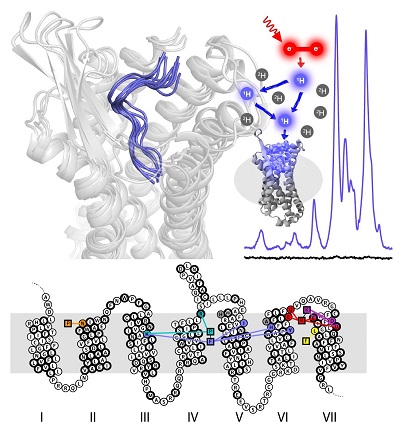News Archive
Subtype specificity in human peptide GPCRs by DNP-enhanced solid-state NMR
January 2018. G-protein-coupled receptors (GPCRs) are the most important signal transducers in higher eukaryotes. GPCR subtypes are closely related receptors with high sequence similarity, but they can differentiate between sets of ligands that are highly similar in structure or sequence by binding to them with substantially different affinities. Despite major recent advances in understanding the molecular basis of GPCR signaling, the foundations of subtype selectivity, especially for peptide ligand GPCRs, remained poorly understood, which hampers mechanistic understanding and rational drug design for peptide receptors.
A new study by groups from the MPI of Biophysics, Vanderbilt University and Goethe University Frankfurt used DNP-enhanced solid-state NMR integrated with advanced molecular modeling and biochemical methods to resolve the mechanism of the subtype selectivity of human bradykinin receptors for their peptide agonists. The mechanism is strikingly more complex than previously assumed. More ...
The detailed molecular picture obtained by this study opens a new gateway for exploring the complex conformational and chemical space of peptides and peptide analogs for designing GPCR subtype-selective biochemical tools and drugs.
Contacts:
Clemens Glaubitz, Biophysical Chemistry, Goethe University Frankfurt, Germany, glaubitz@em.uni-frankfurt.de, www.glaubitz-lab.de
Jiafei Mao, Biophysical Chemistry, Goethe University Frankfurt, Germany, j.mao@em.uni-frankfurt.de, www.glaubitz-lab.de
Hartmut Michel, MPI of Biophysics, Frankfurt, Germany, Hartmut.Michel@biophys.mpg.de
Publication:
Lisa Joedicke*, Jiafei Mao*, Georg Kuenze*, Christoph Reinhart, Tejaswi Kalavacherla, Hendrik R A Jonker, Christian Richter, Harald Schwalbe, Jens Meiler, Julia Preu, Hartmut Michel* & Clemens Glaubitz*: The molecular basis of subtype selectivity of human kinin G-protein-coupled receptors. Nature Chemical Biology, published online 15 January 2018 (first release). http://dx.doi.org/10.1038/nchembio.2551
Cluster of Excellence Macromolecular Complexes, Frankfurt am Main, Germany


